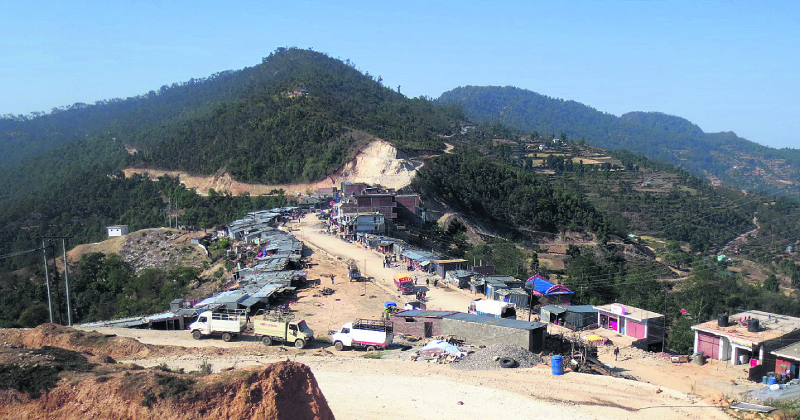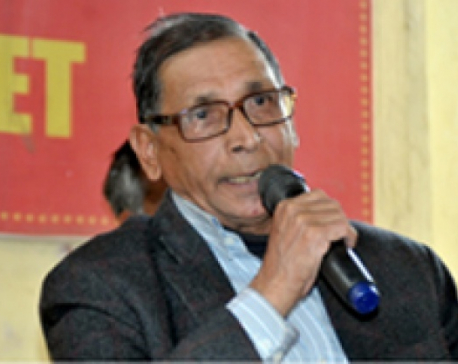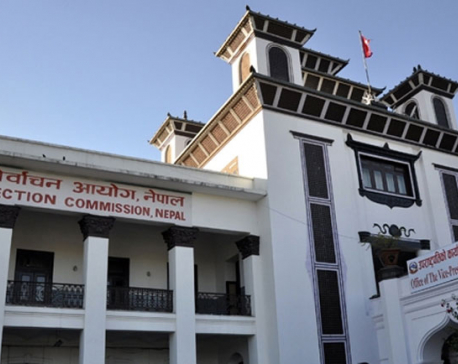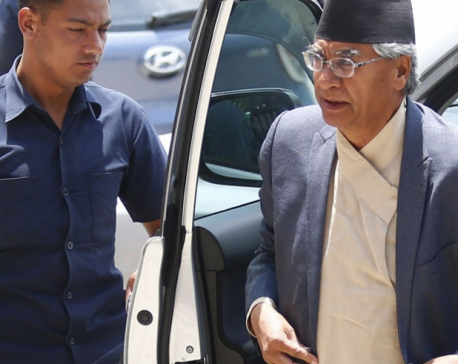
OR

ROLPA, May 5: Holeri bazaar of Rolpa has a special connection with the ‘people’s war’. During the decade-long Maoist insurgency, this town never remained at peace. On 13 February of 1996, Maoists attacked the police post in Holeri and went underground officially. While the police were not prepared for the attack, the rebels had bombed with powerful explosives.
Next day, the government deployed additional number of police personals in Holeri. Soon after the incident, Gyanendra Giri and Chop Bahadur Dangi of the rebel side were taken to Dangchhedi jungle and killed by police. Along with that Maoist rebels snatched away guns from the Rashtriya Banijya Bank security guards. This intensified conflict in the area.
Though fear continued to hunt the locals, other severe tragic incident however did not follow until 26 June, 2001. On the fateful day, Maoists kidnapped 71 police personals including police inspector Madan Gurung. Holeri police post was moved to the district headquarters. Conflict continued. During crossfire, police constable Rajbahadur Giri was killed. Following this, the police force surrendered. After few days, Maoists organized press meet and freed the kidnapped police personals.
“During the conflict, Holeri always remained tense. Nepal Army was stationed here for security. But they never tortured locals. Even the Maoists did not treat the locals cruelly,” reminisced Kulraj Acharya, a local teacher.
Narrating the tit bits of the wartime, Achayra said that the serious battle between the security force and rebels however never let the place be at peace. The conflict in the area intensified after police hostage situation. “More armed people, more vehicles, and more weapons. Everything seemed to change,” he said.
According to Rudra Mani Subedi, a teacher at the Holeri Secondary School, passing of helicopters over the sky would send shivers down his spine. He said that it felt more like a war zone. “The incident of killing of police, their kidnapping and loss of the other side was only triggering further conflict. This area felt like a war zone somewhere outside of Nepal,” he said.
Locals would get nervous over the scary scene. However, with time, they became familiar to such violence. They would only hope of being not harmed by either of the warring parties.
“The sight of police, army, Maoists would make people quite nervous. But as time passed, they became used to all that,” Subedi reported. “Later, they even helped both sides in providing shelter and food,” he added.
Following the Maoist attack in Holeri, the government blocked the main road to Holeri. For nearly two years, locals had to take help of mules and sheep to carry goods. “Transportation was a challenge since the road was blocked. Those who were used to using road had to walk through steep tracks, up and down, amid all the risk. For almost two years, people suffered in lack of road,” Subedi said.
Now the hope is election
The tragic days are now gone. They are only in the memory of the people, remarked Subedi. According to him, the much needed changed is now on the way in the form election.
“What happened has passed away. Whether it happened for good or bad, it’s now gone. Now, local elections are at the door step. This is a time to celebrate. This is going to bring real change and will opens way for development,” he said.
Holeri lost whatever infrastructures it had to the war. The government has not put much effort in reconstructing. Similarly, people’s daily live have not fully came on track either. But then, the election is going to change the face of Holeri and its people, noted Devendra Bohora, mayoral candidate for Holeri Rural municipality from Nepali Congress. “Holeri, which has remained damaged and nervous for such a long period is going to have real peace and development after the elections. Its face will change, after the polls,” he added.
There are four secondary schools in Holeri now. Holeri bazaar looks crowded. Since the end of conflict there have been some changes in this city, Buddhilal Sejuwal, a local health worker remarked. But, people want to have more positive change , he added.
“Of course, it has turned better after the end of the war. We have electricity, internet, roads, schools and so on. But then, development does not mean that alone. We believe that the local polls are going to ensure all the basic infrastructures that we need,” he stated.
Locals in Holeri hope that they will see wholesome development post election. Better road networks, health and education facilities and employment are their major needs.. “We have many resources to tap and harness. We are hoping that the elections are going to open door for that,” Sejuwal said.
You May Like This

Will support progressive party in polls: leader Baidya
KATHMANDU, Oct 15: The CPN-Revolutionary Maoist General Secretary Mohan Baidya today said his party would support any progressive republic party... Read More...

Report of commission helpful for proceeding polls preparations: CEC
KATHMANDU, Aug. 31: Chief Election Commissioner Dr Ayodhee Prasad Yadav has said that the preparations for the polls of House... Read More...

PM proposes holding provincial, parliamentary polls simultaneously
KATMANDU, July 27: Prime Minister Sher Bahadur Deuba has proposed with the Election Commission (EC) to conduct both the provincial and... Read More...




Just In
- Govt receives 1,658 proposals for startup loans; Minimum of 50 points required for eligibility
- Unified Socialist leader Sodari appointed Sudurpaschim CM
- One Nepali dies in UAE flood
- Madhesh Province CM Yadav expands cabinet
- 12-hour OPD service at Damauli Hospital from Thursday
- Lawmaker Dr Sharma provides Rs 2 million to children's hospital
- BFIs' lending to private sector increases by only 4.3 percent to Rs 5.087 trillion in first eight months of current FY
- NEPSE nosedives 19.56 points; daily turnover falls to Rs 2.09 billion















Leave A Comment